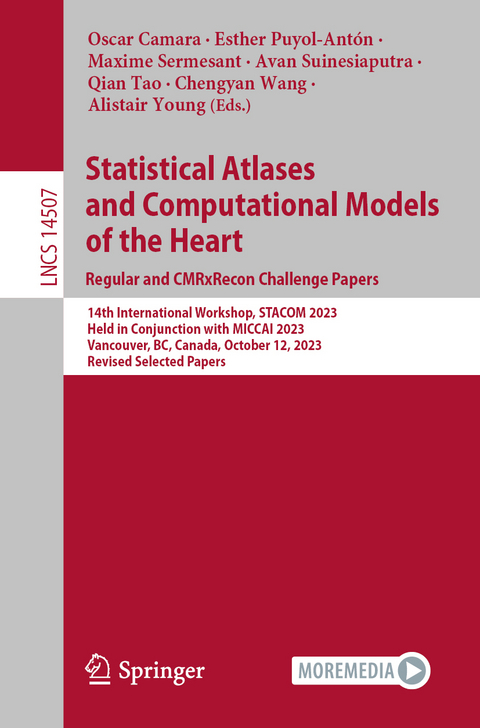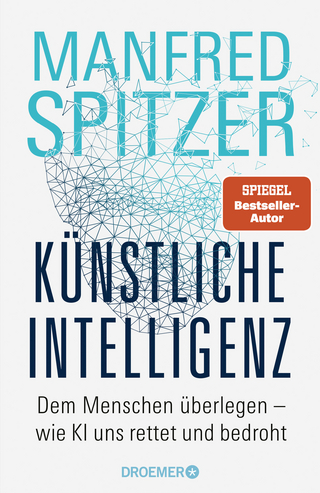
Statistical Atlases and Computational Models of the Heart. Regular and CMRxRecon Challenge Papers
Springer International Publishing (Verlag)
978-3-031-52447-9 (ISBN)
There was a total of 53 submissions to the workshop.
The 24 regular workshop papers included in this volume were carefully reviewed and selected from 29 paper submissions. They deal with cardiac segmentation, modelling, strain quantification, registration, statistical shape analysis, and quality control.
In addition, 21 papers from the CMRxRecon challenge are included in this volume. They focus on fast CMR image reconstruction and provide a benchmark dataset that enables the broader research community to promote advances in this area of research.
CardiacSeg: Customized Pre-Training Volumetric Transformer with Scaling Pyramid for 3D Cardiac Segmentation.- Voxel2Hemodynamics: An End-to-end Deep Learning Method for Predicting Coronary Artery Hemodynamics.- Deep Learning for Automatic Strain Quantification in Arrhythmogenic Right Ventricular Cardiomyopathy.- Patient Stratification Based on Fast Simulation of Cardiac Electrophysiology on Digital Twins.- Deep Conditional Shape Models for 3D cardiac image segmentation.- Global Sensitivity Analysis of Thrombus Formation in the Left Atrial Appendage of Atrial Fibrillation Patients.- Sparse annotation strategies for segmentation of short axis cardiac MRI.- Contrast-Agnostic Groupwise Registration by Robust PCA for Quantitative Cardiac MRI.- FM-Net: A Fully Automatic Deep Learning Pipeline for Epicardial Adipose Tissue Segmentation.- Automated quality-controlled left heart segmentation from 2D echocardiography.- Impact of hypertension on left ventricular pressure-strain loop characteristics and myocardial work.- Automated segmentation of the right ventricle from 3D echocardiography using labels from cardiac magnetic resonance imaging.- Neural Implicit Functions for 3D Shape Reconstruction from standard Cardiovascular Magnetic Resonance views.- Deep Learning-based Pulmonary Artery Surface Mesh Generation.- Impact of catheter orientation on cardiac radiofrequency ablation.- Generating Virtual Populations of 3D Cardiac Anatomies with Snowflake-Net.- Effects of Fibrotic Border Zone on Drivers for Atrial Fibrillation: An In-Silico Mechanistic Investigation.- Exploring the relationship between pulmonary artery shape and pressure in Pulmonary Hypertension: A statistical shape analysis study..- Type and Shape Disentangled Generative Modeling for Congenital Heart Defects.- Automated Coronary Vessels Segmentation in X-ray Angiography Using Graph Attention Network.- Inherent Atrial Fibrillation Vulnerability in the Appendages Exacerbated in Heart Failure.- Two-Stage Deep LearningFramework for Quality Assessment of Left Atrial Late Gadolinium Enhanced MRI Images.- Automatic Landing Zone Plane Detection in Contrast-Enhanced Cardiac CT Volumes.- A Benchmarking Study of Deep Learning Approaches for Bi-atrial Segmentation on Late Gadolinium-enhanced MRIs.- Fill the K-Space and Refine the Image: Prompting for Dynamic and Multi-Contrast MRI Reconstruction.- Learnable objective image function for accelerated MRI reconstruction.- Accelerating Cardiac MRI via Deblurring without Sensitivity Estimation.- T1/T2 relaxation temporal modelling from accelerated acquisitions using a Latent Transformer.- T1 and T2 mapping reconstruction based on conditional DDPM.- $k$-$t$ CLAIR: Self-Consistency Guided Multi-Prior Learning for Dynamic Parallel MR Image Reconstruction.- Cardiac MRI reconstruction from undersampled k-space using double-stream IFFT and a denoising GNA-UNET pipeline.- Multi-Scale Inter-Frame Information Fusion Based Network for Cardiac MRI Reconstruction.- Relaxometry Guided Quantitative Cardiac Magnetic Resonance Image Reconstruction.- A Context-Encoders-based Generative Adversarial Networks for Cine Magnetic Resonance Imaging Reconstruction.- Accelerated Cardiac Parametric Mapping using Deep Learning-Refined Subspace Models.- DiffCMR: Fast Cardiac MRI Reconstruction with Diffusion Probabilistic Models.- C3-Net: Complex-Valued Cascading Cross-Domain Convolutional Neural Network for Reconstructing Undersampled CMR Images.- Space-Time Deformable Attention Parallel Imaging Reconstruction for Highly Accelerated Cardiac MRI.- Multi-level Temporal Information Sharing Transformer-based Feature Reuse Network for Cardiac MRI Reconstruction.- Cine cardiac MRI reconstruction using a convolutional recurrent network with refinement.- ReconNext:A Encoder-Decoder Skip Cross Attention based approach to reconstruct Cardiac MRI.- Temporal Super-Resolution for Fast T1 Mapping.- NoSENSE: Learned Unrolled Cardiac MRI Reconstruction Without Explicit Sensitivity Maps.- CineJENSE: Simultaneous Cine MRI Image Reconstruction and Sensitivity Map Estimation using Neural Representations.- Deep Cardiac MRI Reconstruction with ADMM.
| Erscheinungsdatum | 05.02.2024 |
|---|---|
| Reihe/Serie | Lecture Notes in Computer Science |
| Zusatzinfo | XIV, 494 p. 169 illus., 149 illus. in color. |
| Verlagsort | Cham |
| Sprache | englisch |
| Maße | 155 x 235 mm |
| Gewicht | 771 g |
| Themenwelt | Informatik ► Theorie / Studium ► Künstliche Intelligenz / Robotik |
| Schlagworte | Artificial Intelligence • cardiac atlas • Cardiac modelling • Deep learning • Image Analysis • Image Processing • Image Quality • image reconstruction • Image Segmentation • machine learning • Medical Image Analysis • pattern recognition • Signal Processing • statistical shape analysis |
| ISBN-10 | 3-031-52447-0 / 3031524470 |
| ISBN-13 | 978-3-031-52447-9 / 9783031524479 |
| Zustand | Neuware |
| Haben Sie eine Frage zum Produkt? |
aus dem Bereich


